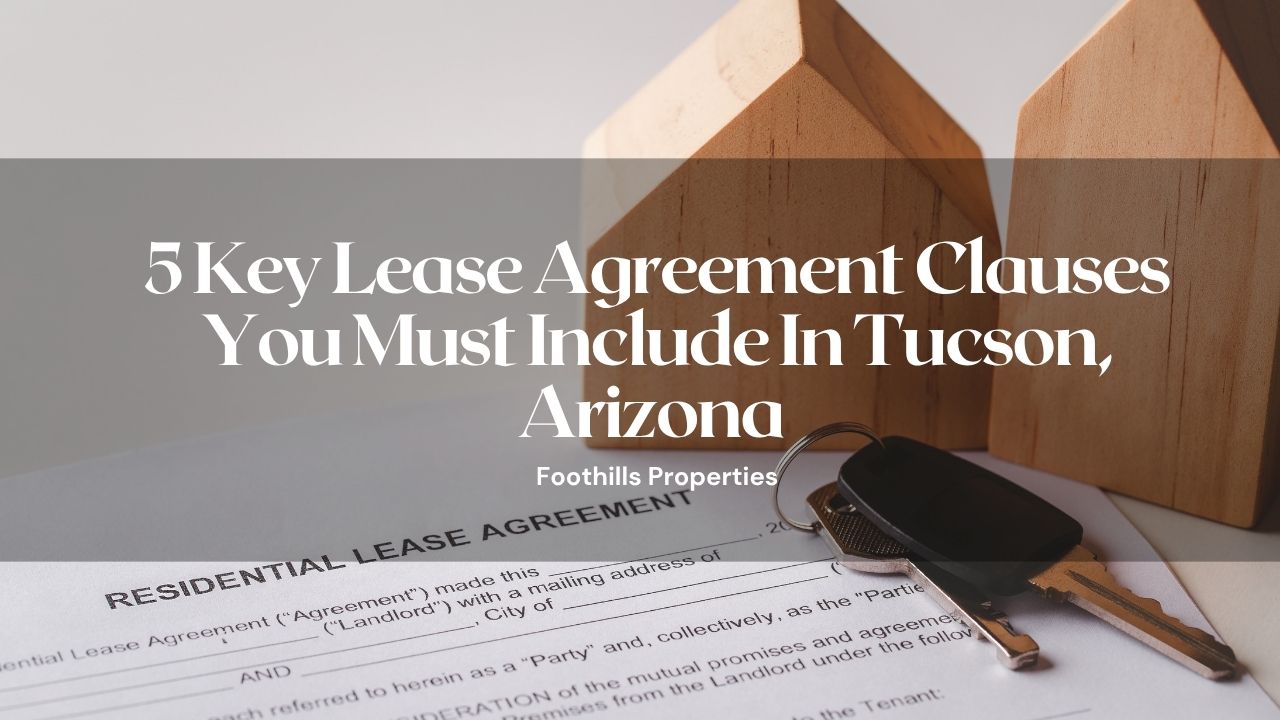
Being a landlord in Arizona comes with a long list of responsibilities. One of the most important is having a strong, detailed lease agreement. A well-written lease not only outlines expectations between you and your tenants but also protects your property and financial interests. Let’s walk through five essential lease clauses that every landlord should include to help prevent confusion, avoid disputes, and safeguard your rental business.
1. Rent Details and Payment Terms
The first clause may seem obvious, but clarity here is everything. Rent terms should spell out not just the amount due each month, but exactly when, how, and where it’s to be paid.

Make sure your lease includes:
The monthly rent amount and due date
Late fee amounts and when they take effect
Accepted payment methods (online portal, check, etc.)
The legal consequences of non-payment
Clear payment terms make it easier to enforce your lease if a tenant stops paying. If you ever face that scenario, it’s helpful to understand how Arizona law handles rent defaults, including your rights as a landlord when a tenant is not paying rent in Tucson.
2. Maintenance Responsibilities
Maintenance disputes are among the most common issues between landlords and tenants. The best way to avoid them is by clearly defining who’s responsible for what.

Be specific about:
Routine upkeep like lawn care, cleaning gutters, and changing light bulbs
How and when tenants must report needed repairs
Responsibility for tenant-caused damage or guest-related issues
What qualifies as normal wear and tear
If you expect tenants to handle basic yard work or small fixes, include it in writing. A clear maintenance clause reduces misunderstandings and helps preserve your property’s condition over time. For landlords trying to maximize returns, setting up efficient systems for upkeep is one of many tips for running a profitable rental business.
3. Occupancy and Subletting Rules
It’s essential to know exactly who is living in your rental. This clause helps you maintain control over your property and ensures that the individuals you approved are the ones actually residing there.
Your lease should cover:
The names of all authorized occupants
Whether subletting is allowed and under what conditions
How long guests can stay before they’re considered occupants
The approval process for subletting requests
Without this clarity, you risk having unauthorized tenants, which can complicate legal responsibilities and insurance coverage. In some cases, long-term unauthorized occupants may even claim rights similar to tenants. Arizona’s regulations around squatters’ rights highlight how important it is to define and enforce occupancy terms in your lease.
4. Entry and Access to the Property
While landlords have a right to access their property for maintenance, inspections, or emergencies, tenants also have a right to privacy. Striking this balance is not only professional—it’s the law.
In Arizona, landlords are required to provide at least 48 hours’ notice before entering a tenant’s unit, except in emergencies. Your lease should specify:
How much notice you’ll provide before entry
What reasons allow for access (repairs, inspections, etc.)
How emergency situations are handled
By documenting these details, you build trust with tenants and stay compliant with local privacy regulations. For landlords managing multiple units or new rentals, reviewing how Arizona handles notice and property access under the eviction process in Tucson can offer helpful context for setting proper expectations.
5. Early Termination and Lease Breaks
Few things disrupt a landlord’s income like a tenant breaking their lease early. A clear early termination clause helps you plan ahead and minimize losses.

Consider including:
An early termination fee or buy-out amount
Conditions under which a tenant may end the lease early (such as job relocation or military service)
Whether the tenant must cover re-rental or advertising costs
How much notice they’re required to provide
This clause makes the process more predictable for both parties and provides leverage if a tenant leaves unexpectedly. It can also help you get your unit re-rented faster and avoid unnecessary vacancy time.
Final Thoughts
A strong lease agreement does more than collect rent—it’s the foundation of a healthy landlord-tenant relationship. By including these five clauses, you reduce the risk of legal issues, protect your investment, and maintain smoother operations for your rental business.
If you’re unsure whether your current lease includes the right protections or want help reviewing your agreement, Tucson Foothills Properties is here to support local landlords in creating reliable, compliant leases that protect their time and income.
Visit tucsonfoothills.com to explore property management services and insights tailored to Arizona landlords.








